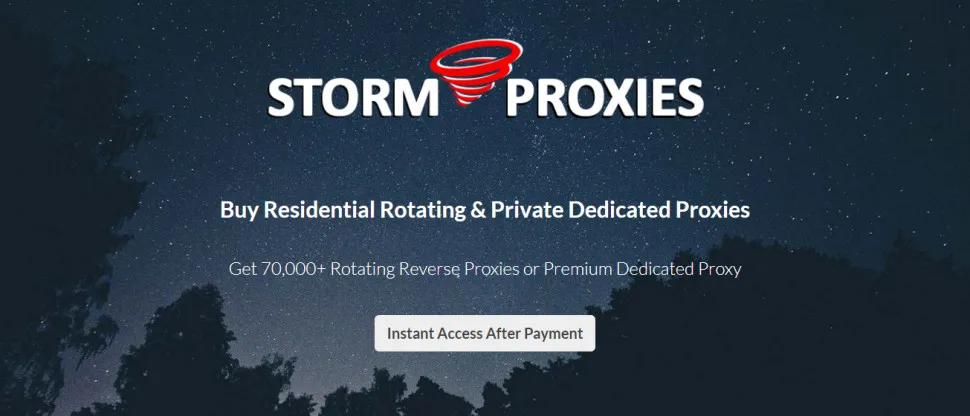Storm Proxies: Features Overview
Storm Proxies offers a variety of proxy services with an emphasis on reliability and simplicity. It focuses primarily on residential and datacenter proxies, offering core functionality for users involved in activities like web scraping, bypassing geo-restrictions, and more. Below is an in-depth look at its features:
Residential Proxies
- Pool Size: Storm Proxies provides a rotating pool of approximately 700,000 residential IPs. These proxies are sourced from real devices whose owners have agreed to share their bandwidth in exchange for benefits (e.g., VPN access).
- IP Rotation: The proxies rotate every 3 to 5 minutes, offering higher anonymity and reducing the chances of detection by websites. This frequent rotation makes it harder for websites to detect and block scraping activities.
- Usage: Ideal for web scraping tasks, especially for bypassing geo-restrictions or scraping ticketing sites like StubHub and Ticketmaster, which block non-local traffic. The residential proxies allow users to select IPs from regions like the US and EU to bypass geo-blocks.
- Bandwidth: Storm Proxies provides unlimited bandwidth for residential proxies, so users don’t need to worry about data limits during large-scale scraping operations.
- Speed: Testing showed that Storm Proxies offers fast speeds with minimal slowdown compared to standard access. However, the pool is limited to the US and EU, meaning it lacks global coverage.
Datacenter Proxies
- Static IPs: Unlike rotating residential proxies, datacenter proxies are static and assigned to a user for an extended period. Users can request up to two replacements per month.
- Speed and Reliability: Datacenter proxies provide fast and reliable speeds as they are tied to physical servers with stable connections. They are ideal for large-scale scraping tasks due to their better performance and reliability.
- Geographical Availability: These proxies are only available in US locations (Cheyenne, Los Angeles, New York City), which limits Storm Proxies’ global reach for datacenter IPs.
- Affordability: The pricing is competitive, with plans starting as low as $1.60 per month per IP, providing unlimited bandwidth, making them cost-effective for users who need large volumes of data scraped.
Backconnect Proxies
- Rotating IPs for More Anonymity: Storm Proxies offers Backconnect proxies that automatically rotate IPs either every 3 minutes or 15 minutes. This dynamic IP assignment increases user anonymity, especially when handling multiple requests or accounts.
- Configurable Plans: Users can select between 3-minute or 15-minute rotations, with the ability to get a fresh IP on every new HTTP request. This allows for seamless browsing or scraping without manual IP switching.
- Connection Limits: The number of concurrent connections available varies depending on the plan, with options ranging from 40 to 150 simultaneous connections. Users can access unlimited bandwidth with each plan, making it well-suited for data-intensive tasks.
- Performance: Backconnect proxies were reliable during testing, offering smooth rotations, though some request failures were noted. However, the limited pool of 700,000 proxies remains a downside compared to competitors with larger IP pools.
Limitations
- Limited Proxy Pool: With only 700,000 IPs, Storm Proxies lags behind competitors offering tens of millions of IPs, limiting the ability to scale.
- Geographical Reach: The service has a heavy focus on US and EU locations, with minimal coverage in other parts of the world. This could be problematic for users needing proxies in regions like Asia or Africa.
- Lack of Web Scraping API: Unlike other providers, Storm Proxies does not offer a web scraping API, which would be useful for automating data scraping tasks. Many competitors provide APIs to streamline web scraping processes, while Storm Proxies requires users to manage scraping themselves using the proxies.
Pricing Plans
- Residential Proxies: Storm Proxies does not offer bandwidth-based pricing, which could be a disadvantage for users needing only small amounts of bandwidth. Instead, it uses monthly plans.
- Datacenter IPs: As mentioned, datacenter proxies are available for as low as $1.60 per month for each IP, making them very cost-effective for users who need static proxies for high-volume tasks.
- Backconnect Proxies: These proxies are available in different plans that offer varying levels of concurrent connections, starting with smaller plans for casual users and scaling up to larger plans for high-volume scraping operations.
Ease of Use
- Simple Dashboard: Storm Proxies provides a user-friendly dashboard, with straightforward navigation. Setting up proxies is simple and intuitive, especially for users with minimal technical experience.
- No Usage Reports: One drawback is the lack of usage reports. Unlike many competitors, Storm Proxies doesn’t provide detailed statistics on bandwidth usage, which could be useful for managing large-scale operations.
Customer Support
- Limited Support Options: Storm Proxies offers 24/7 support, but only through email, with no live chat or phone support available. Users may need to wait up to 24 hours for a response, which could be a drawback for those needing urgent assistance.
- Knowledge Base: The platform provides a Knowledge Base with guides on common issues and setup instructions. However, given the lack of real-time support, users may need to rely on the Knowledge Base for troubleshooting.
Conclusion
Storm Proxies is a reliable and affordable choice for individuals or businesses needing residential proxies primarily from the US and EU. It’s especially suitable for users focused on web scraping and bypassing geo-restrictions, with rotating residential proxies and strong performance. However, it has limitations in global IP coverage and advanced features like web scraping APIs and usage reports. For those needing a larger pool of IPs or more advanced features, competitors may be a better fit.
